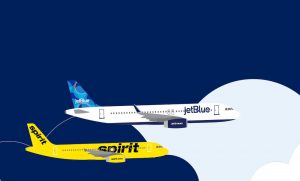A federal judge halted JetBlue Airways' ambitious $3.8 billion purchase of Spirit Airlines, following a lawsuit filed by the Justice Department. The judge's decision, announced on January 16, 2024, raised concerns that the proposed merger would lead to increased fares for price-sensitive consumers, removing the discount carrier Spirit from the market.
The proposed merger aimed to create the country's fifth-largest airline, providing JetBlue and Spirit with a competitive edge against larger rivals such as Delta and United. However, U.S. District Court Judge William Young expressed “JetBlue plans to convert Spirit’s planes to the JetBlue layout and charge JetBlue’s higher average fares to its customers. The elimination of Spirit would harm cost-conscious travelers who rely on Spirit’s low fares.”
The Justice Department, which filed the lawsuit in March 2023, argued that JetBlue's acquisition of Spirit would eliminate about half of all ultra-low-cost airline seats in the industry, forcing passengers to pay higher fares. The decision represents a significant victory for the Justice Department's ongoing efforts to curb deals deemed anti-competitive.
Attorney General Merrick Garland emphasized “Today’s ruling is a victory for tens of millions of travelers who would have faced higher fares and fewer choices had the proposed merger between JetBlue and Spirit been allowed to move forward.”
Spirit Airlines, known for its rapid growth by offering cheap fares and various fees, experienced a 47% plunge in its shares following the ruling. JetBlue's stock, on the other hand, gained about 5%. The decision came at a time when Spirit was already grappling with grounded airplanes due to an engine manufacturing issue and softer-than-expected travel demand.
In a joint statement, both the companies expressed disagreement with the ruling and asserted that the termination of the Northeast Alliance and commitment to significant divestitures addressed any reasonable anti-competitive concerns raised by the Justice Department.
JetBlue's aggressive pursuit of Spirit included a hostile takeover bid launched shortly after Frontier Airlines and Spirit agreed to merge in a cash-and-stock deal. The rejection of the company's initial takeover offer by Spirit's board led to a prolonged negotiation process. Eventually, Spirit shareholders rejected the Frontier deal and approved a sweetened JetBlue proposal in October 2022.
The decision leaves JetBlue contemplating its next steps, with incoming CEO Joanna Geraghty tasked with guiding the airline on a new path. The company had argued that access to Spirit's fleet of Airbus planes would allow for rapid growth, particularly in regions facing a shortage of planes and pilots. The airline's strategy involved using Spirit to gain access to more routes and travelers, aiming to compete against dominant players in the industry.
The ruling by Judge Young underscores the complexities and challenges in the airline industry, where consolidation has left a few major carriers in control of a significant portion of the domestic market. As JetBlue evaluates its options, the future of its plans to reshape Spirit's yellow planes and compete as a more full-service model remains uncertain.






















